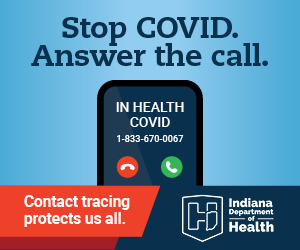Contact tracers offer facts with compassion
posted by Brent Brown on October 21, 2020
There’s unexpected emotional reward for contact tracers, who play a vital role in helping slow the spread of COVID-19 in Indiana.
Kayla Gatt helped a COVID-19 positive man living in a camp for people experiencing homelessness. While the man was skeptical of someone on the other end of his cell phone trying to help, he wasn’t able to self-isolate.
Problem-solver Gatt connected him to 211, which referred him to a place that offers short-term living during isolation, and he had shelter before his first weekly follow-up call. When that tracer realized the man needed food, too, she helped him learn about free local food drives. By the third weekly call, the client was appreciative and pleasantly surprised that tracers had been so helpful.
There’s also heartache for tracers.
“It’s a really hard job to do on so many levels,” said team lead Cathy Roland, a nurse practitioner. “It’s dealing with human beings at their worst with this fearful illness.”
Some tracers have broken the news of a positive test. Other times, they hear bad news.
“It happens often that calls are made when someone’s dying, or they just died,” said supervisor Ann Zinyemba, noting how emotionally wrenching that is for her workers. “I sometimes pull them into a Zoom room and talk them down. I’ve had grown men and women crying.”
Interviewing Hoosiers who test positive
This remote effort works to contact people who test positive for COVID-19 so they can stay home and lower the risk of viral spread to others. When a contact tracer calls, he or she asks a series of questions about where the person lives, with whom they have been in contact within six feet for more than 15 minutes, and other questions about their health.
Sometimes it’s easy to reach the individual because their case information is readily available. When vital information — full name, address, phone number(s) or date of birth to confirm identity — is missing, research is next. With complete information on someone, the call center immediately texts contact phone numbers with a message and IDOH number to call. The center also makes follow-up calls and sends a letter to the person’s home to get in touch.
Those who answer the text or call are asked to complete a phone interview with one of about 1,000 contact tracers. The goal is to find out where a person went and things someone did during the infectious period. That is 10 days starting from 48 hours before symptoms began, or 48 hours before the test was taken if the person has no symptoms. The confidential calls take from about 25 minutes to more than an hour at times, partly depending on how much close contact information there is.
Individuals also receive guidance about self-isolation and are connected with additional services if they are concerned about being able to safely self-isolate. Those with questions about underlying conditions, medicine or isolation time are connected to a medical escalation unit for expert recommendations.
If contact tracers can’t reach a person, the local health department tries other ways to connect, including in-person visits.
Finding close contacts
The contact tracing program also reaches out to close contacts and monitors them. These people are at higher risk of getting the virus because they were close enough for long enough to someone who has tested positive.
Until their quarantine period ends, close contacts are monitored daily through a short survey. It can be completed by text, email, or a phone call with a tracer. If a call is made, the name of the positive person to whom they were exposed to is kept confidential.
From May 11 to Sept. 17, tracers interviewed more than 55,000 people with a positive test or 70 percent of that group. More than 72,000 close contacts were reached and monitored, or 56.4 percent of those people.
Indiana’s Sept. 21 daily positivity rate was 3.9 percent. That number helped guide Gov. Eric J. Holcomb’s decision to move to Stage 5 of the Back on Track Indiana plan starting Sept. 26.
Please ‘Answer the Call’
Contact tracing is so important to containing the spread of COVID-19 that the Indiana Department of Health launched a media campaign in October to help Hoosiers recognize that the call or text they get is legitimate and encourage them to reply. “Answer the Call” is running on radio, social media, and TV statewide.
While the job of the contact tracer is to give information, they also listen.
“A call,” said contact tracer Jillian Rafalski, “has the opportunity to give someone comfort in a time when they really need it.”
One of the positive individuals she talked with was an older, lonely woman who was in the hospital. She’d lost her husband, daughter, and grandson in the previous few years. A nurse couldn’t even keep her company due to exposure time limits. “I was nearly in tears listening to her story,” Rafalski said.
“She was so thankful to speak with someone and just explain how she was feeling. She kept saying how she is praying for me and everyone who is doing what we do. Even in her condition, she was thinking of other people.
“Contact tracers can’t do much to make people feel physically better, but we sure can help patients deal with one of the worst parts of COVID-19: the feeling of being alone.”
Story by Judy Wolf, Indiana Department of Health
